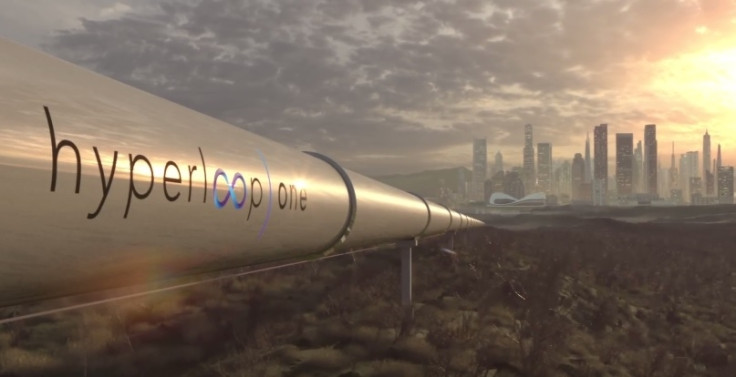After 4 years, Elon Musk grew bored of waiting - so he's building his own hyperloop
Musk and The Boring Company plan to dig tunnels and build a 600mph train.
In August 2013, four days before he published a 57-page whitepaper detailing the hyperloop, Elon Musk claimed he had no plans of producing the levitating 600mph train himself. "I'm too strung out" he said, before adding that, if no one makes progress on his plans in the next few years, he might attempt to "make it happen".
Since then, what began as "a cross between Concorde, a railgun and an air hockey table" has morphed into the next great breakthrough in public transportation. Not just a faster train, but a whole new way of travelling that can bring far-away cities closer together, thanks to pods blasting through a near-vacuum tunnel faster than a commercial airliner.
Three companies – Hyperloop One, Hyperloop Transportation Technologies and Arrivo – have ploughed serious effort (and cash) into making Musk's dreams a reality, with the former already reaching 192mph. But perhaps this isn't the progress Musk had hoped for. Maybe the Tesla and SpaceX boss thought more would have been achieved in four years.
Not content with watching from the sidelines, Musk has chucked his hat into the ring.
First he founded The Boring Company in late 2016, digging a hole in SpaceX's Los Angeles car park to see how tunnel boring works and if he can make it quicker. This being Musk, a man who wants to have a human colony on Mars by 2040, the goal was ten times quicker. Then he published an animation demonstrating how the tunnels could be used to whisk Tesla cars underneath congested cities on electric sleds at over 120mph. A car-sized elevator at each end would lift passengers in and out, skipping the gridlocked streets above in a few short minutes.

After the glossy animation came a bizarre and profound claim. Musk tweeted on 20 July: "Just received verbal govt approval for The Boring Company to build an underground NY-Phil-Balt-DC Hyperloop. NY-DC in 29 mins."
Just received verbal govt approval for The Boring Company to build an underground NY-Phil-Balt-DC Hyperloop. NY-DC in 29 mins.
— Elon Musk (@elonmusk) July 20, 2017
Many dismissed this claim as bluster. The US Congress and officials from the cities involved said Musk did not have approval, and beyond acknowledging "promising conversations" the White House had nothing more to say.
The following month, an unnamed person close to Musk told Bloomberg how the billionaire entrepreneur was going to build the entire hyperloop system – not just boring tunnels, but producing the pods, the power supply, "the entire thing". Not only that, but it was also discovered that, through his SpaceX rocket building company, Musk holds a trademark for "Hyperloop", which in theory could be used to stop other companies from employing the name.
Then came the confirmation. A statement was issued by The Boring Company revealing its plans "to build low-cost, fast-to-dig tunnels that will house new high-speed transportation systems."
It went on: "Most will be standard pressurised tunnels with electric skates going 125+mph. For long-distance routes in straight lines, such as NY to DC, it will make sense to use pressurised pods in a depressurised tunnel to allow speeds up to approximately 600+mph (AKA Hyperloop)."

And there it is. Just in case a pressurised pod travelling through a depressurised tunnel at 600mph wasn't enough of a clue, the company spells it out. Elon Musk's Boring Company is planning to build a hyperloop.
Rather than derail the progress made by hyperloop companies to date, Musk's overdue participation will be a benefit, says Arrivo founder Brogan BamBrogan. "The industry can't get built by any one company, and to have a heavyweight like Elon put his hat in the ring says a lot of good things." BamBrogan, who initially co-founded Hyperloop One before launching Arrivo, told Wired. "It validates the market and the idea that the tech can create some real value for people."
Going back to Musk's first thoughts on building a hyperloop himself, that he would revisit the project if no one had made enough progress in the coming years. This appears to now be the case, as a Boring Company spokesperson told Wired: "He said at the time that he would only seek to commercialise hyperloop if after a few years other companies were not moving quickly enough.
"While we're encouraged that others are making some progress, we would like to accelerate the development of this technology as fast as possible."
It isn't clear if Musk and The Boring Company will seek to work with existing hyperloop firms – and if the likes of Hyperloop One will be willing to collaborate – or if he will go his own way. Whatever happens, the arrival of Musk's name, image and resources are a shot in the arm to any industry, never mind one as captivating an electric, 600mph, levitating bullet train.
© Copyright IBTimes 2025. All rights reserved.






















